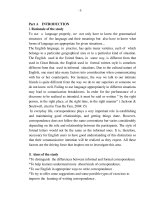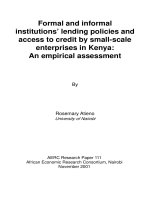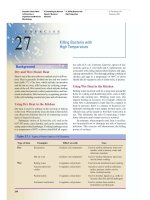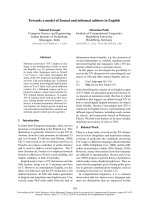39694 exercises in formal and informal english
Bạn đang xem bản rút gọn của tài liệu. Xem và tải ngay bản đầy đủ của tài liệu tại đây (95.66 KB, 3 trang )
Exercises in Formal and Informal English
Pronunciation
Correct language
Informal
pronunciation
Formal Example
Informal Example
can
kin
“My manager can approve your application.”
“I can help you with that.”
to
ta
“I have to speak to the director.”
“Take some time to talk to me.”
you
ya
“I will get back to you in a moment.”
“We’ll leave whenever you want (to leave).”
your
yur
“I am calling to confirm your appointment.”
“I hope you’re having a good time on your
birthday.”
for
fur
“I am making a request for information.”
“Thanks for everything!”
what you
what’cha
“See what you can find out about this.”
“I have what you want.”
used to
use ta
“I used to do all my business here.”
“This used to be my favorite restaurant!”
s’posed ta
“We are all supposed to participate.”
“He’s supposed to be here already!”
looking
lookin’
“They are looking into making an
investment.”
“I was looking at that picture!”
taking
takin’
“We’re taking stock of the situation.”
“It’s taking a long time to finish.”
putting
puttin’
“He’s putting me in a new role.”
“He’s not putting any effort into it.”
condensed syllables
supposed to
dropped ‘g’
Contractions and Colloquialisms
Formal
Informal
That is
That’s
That is
You have
You’ve
You have got to speak to someone about this.
You’ve got something there!
You will
You’ll
You will have to have support.
You’ll have to have help.
You had
You’d
You had better be prepared for some criticism.
You’d better get down here fast!
How are
How’re
How are you planning to accomplish this?
How’re ya doin’?
I will
I’ll
I will speak to when I have a chance.
I’ll talk to you when I can.
I will have
I’ll ‘ve
I will have completed my project by next week.
I’ll ‘ve finished all of my projects by then.
Come on
C’mon
Come on over to my office tomorrow.
C’mon over! I’m ordering pizza!
going to
gonna
I am going to start working on that.
I’m gonna start soon.
want to
wanna
Do you want to make a proposal?
Do you wanna say something?
got to
gotta
I have got to get more accomplished today.
I’ve gotta get more done today.
should have
shoulda
We should have called his office first.
We shoulda turned left at the light.
could have
coulda
He could have sent his email yesterday.
He coulda done a better job than that.
cannot
can’t
I cannot hear the speaker on stage.
I can’t hear anything!
am not/are not
ain’t
I am not planning to attend the meeting.
I ain’t goin’ to that party tomorrow.
Pronunciation Exercise
Instructions:
1) read each situation in the first column and identify it as formal or informal in the space provided
2) match each situation with the spoken language in the column at right. Write the letter in the match column
3) read aloud each sentence that matches the given situation. If the situation is informal, use informal language and pronunciation
Situation
F (formal)
or
I (informal)
Match
Spoken Language
You are speaking to the owner of an apartment
building.
a. “When can I expect to hear from you?”
You are speaking about your apartment to a friend.
b. “We are supposed to begin at 7:30 this evening.”
You are responding to your boss who wants to
know why you were not in your office.
c. “I am going to start cooking at 7:30.”
You find your son crawling along the floor of your
kitchen.
d. “I have been looking for you.”
You are offering to treat your friend to dinner.
e. “When can I come over?”
A waiter is taking your order at a restaurant.
f. “You are supposed to be asleep!”
You are asking your doctor to call you back with
test results.
g. “How much do you think I’m paying for this
place?”
You are talking on the phone with your neighbor
across the hall.
h. “How are you coming along with your report?”
You are talking to your son in his bed.
i. “I am not doing that!”
You are speaking with the manager of a hotel
about a conference being held in the hotel.
j. “What would you like to eat?”
You are talking on the phone with a co-worker
about the speech you are giving that evening.
k. “How much do you want for this apartment?”
You are telling your wife what you will do to
make dinner that evening.
l. “What do you want to eat?”
You are typing an email to someone to whom you
have given an assignment at your office.
m. “I have been looking for you.”
You are talking to your wife while waiting to meet
someone for dinner at a restaurant.
n. “I am going to start speaking at 7:30.”
You are disagreeing with your wife about who will
take out the garbage.
o. “Simon should’ve been here an hour ago.”
Pronunciation Exercise—Answer Key
F (formal)
or
I (informal)
Match
You are speaking to the owner of an apartment
building.
F
k
a. “When can I expect to hear from you?”
You are speaking about your apartment to a friend.
I
g
b. “We are supposed to begin at 7:30 this evening.”
You are responding to your boss who wants to
know why you were not in your office.
F
m
c. “I am going to start cooking at 7:30.”
You find your son crawling along the floor of your
kitchen.
I
d
d. “I have been looking for you.”
You are offering to treat your friend to dinner.
I
l
e. “When can I come over?”
A waiter is taking your order at a restaurant.
F
j
f. “You are supposed to be asleep!”
You are asking your doctor to call you back with
test results.
F
a
g. “How much do you think I’m paying for this
place?”
You are talking on the phone with your neighbor
across the hall.
I
e
h. “How are you coming along with your report?”
You are talking to your son in his bed.
I
f
i. “I am not doing that!”
You are speaking with the manager of a hotel
about a conference being held in the hotel.
F
b
j. “What would you like to eat?”
You are talking on the phone with a co-worker
about the speech you are giving that evening.
I
n
k. “How much do you want for this apartment?”
You are telling your wife what you will do to
make dinner that evening.
I
c
l. “What do you want to eat?”
You are typing an email to someone to whom you
have given an assignment at your office.
F
h
m. “I have been looking for you.”
You are talking to your wife while waiting to meet
someone for dinner at a restaurant.
I
o
n. “I am going to start speaking at 7:30.”
You are disagreeing with your wife about who will
take out the garbage.
I
i
o. “Simon should’ve been here an hour ago.”
Situation
Spoken Language









